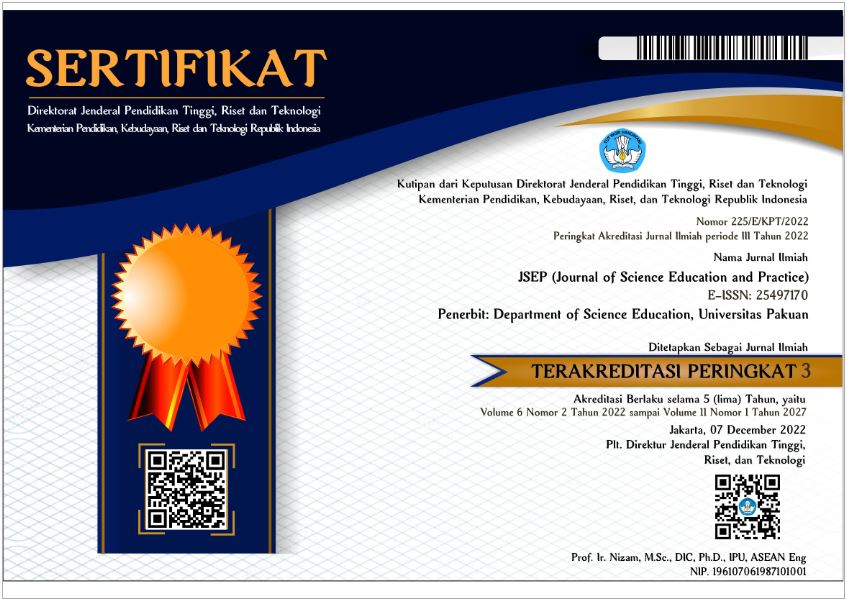ADDITIONAL MENU
IMPLEMENTASI PEMBELAJARAN BERBASIS PROYEK PADA MATERI PENCEMARAN LINGKUNGAN UNTUK MENINGKATKAN LITERASI STEM SISWA SMA
Abstract
Tujuan dari penelitian ini adalah memperoleh gambaran penerapan model pembelajaran berbasis proyek pada materi pencemaran lingkungan yang dapat meningkatkan Literasi STEM siswa SMA serta memperoleh gambaran peningkatan Literasi STEM siswa setelah implementasi model pembelajaran berbasis proyek. Penelitian ini menggunakan metode kuantitatif menggunakan desain penelitian quasi eksperimental dengan rancangan The Matching only Pretest-Posttest Control Group Design. Subjek pada penelitian ini adalah siswa kelas X SMAN 1 Cigombong dengan pengambilan menggunakan dua kelompok subjek dengan menggunakan teknik purposive sampling. Sampel kelas eksperimen berjumlah 35 orang dan kelas kontrol berjumlah 36 orang sehingga keseluruhan subjek penelitian berjumlah 71 orang. Keterlaksanaan pembelajaran diobservasi menggunakan lembar observasi aktifitas guru dan siswa. Hasil Literasi STEM setiap kelompok diukur dengan menggunakan tes pilihan ganda berjumlah 25 soal yang memuat indikator literasi STEM. Respon siswa terhadap model pembelajaran dijaring dengan menggunakan angket skala likert. Dari hasil analisis observasi diperoleh bahwa keterlaksanaan pembelajaran berlangsung dengan sangat baik, prosentase keaktifan siswa juga menunjukkan hasil sangat baik. Hasil analisis data diketahui bahwa pencapaian rerata N_Gain Literasi STEM pada kelas eksperimen termasuk kategori sedang. Sedangkan kelas kontrol memperoleh pencapaian literasi STEM termasuk dalam kategori rendah. Hasil Uji beda t-test menunjukkan bahwa perolehan STEM literasi lebih baik dibandingkan dengan kelas kontrol. Sebagian besar siswa memberikan tanggapan positif terhadap model pembelajaran berbasis proyek, mereka merasa senang, puas dan meningkatkan motivasi dalam belajar.
Kata Kunci: Literasi STEM, Pembelajaran Berbasis Proyek, Pencemaran Lingkungan
References
Afriana, Jaka. (2016). Project Based Learning Integrated to STEM to Enchance Elementary Schools Students Scientific Literacy. Jurnal Pendidikan IPA Indonesia, 5 (2), 261-267.
Baran, M. & Maskan, A. (2010). The Effect of Project-Based Learning On Pre- Service Physics Teachers Electrostatic Achievements. Cypriot Journal of Educational Sciences , 5, 243-257
Becker, K. & Park, K. (2011). Effects of integrative approaches among science, technology, engineering, and mathematics (STEM) subjects on studentslearning: A preliminary meta-analysis. Journal of STEM Education, 12, (5& 6), 23-37.
Bell, S. (2010). Project Based Learning for the 21th Century: Skills for the Future. The Clearing House, 83, 39-43.
Capraro. (2013). STEM Project-Based Learning : An Integrated Science, Technology, Engineering, and Mathematics (STEM) Approach (second ed). Rotterdam : Sense Publishers.
Cook. (2012). Preparing Biology Teachers to Teach Evolution in a Project- Based Approach. Winter, 21 (2) , 18-30
Craig, T. T. (2015). A Statistical Analysis of the Effects of Project-Based Learning on Student High School and College Outcomes. (Dissertation).The University of Texas at Austin.
Doppelt, Y. (2005). Assessment of Project Based Learning in a mechatronics context. Journal of Technology Education, 16 (2), 7-24.
Fraenkel J R & Wallen N E. (2009). How to Design and Evaluate Research in Education (7th ed). Boston : Mc. Graw-Hill Publishing Company.
Kemdikbud. (2015). Materi pelatihan guru implementasi kurikulum 2013 tahun 2015: Mata pelajaran BIOLOGI SMA/SMK. Jakarta: Kementerian Pendidikan dan Kebudayaan.
Kılınç, A. (2010). Can Project-Based Learning Close the Gap?. Turkish Student Teachers and Proenvironmental Behaviours. International Journal of Environmental & Science Education, 5, 495-509.
National Academy of Science. (2015). National Academy of Science. [Online]. Retrieved from http://www.nap.edu/openbook.php?re cord_id=4962
Özer, D., Z., & Özkan, M. (2012). The Effect of the Project Based Learning on the Science Process Skills of the Prospective Teachers of Science. Journal of Turkish Science Education, 9 (3), 131-136.
Sanders, M. (2009). STEM, STEM education, STEMmania. The Technology Teacher, 68 (4), 20-26.
Stohlmann, M.; Moore, T. J.; & Roehrig, G. H. (2012). Considerations for Teaching Integrated STEM Education. Journal of Pre-College Engineering Education Research (J-PEER), 2 (1), 4.
Thomas, J. W. (2000). A review of Research on PBL. Vol/2 . [Online]. Retrieved from http://www.bobpearlman.org/BestPractices/PBLResearch.pdf.
Tseng, et al. (2013). Attitudes Towards Science, Technology, Engineering and Mathematics (STEM) in a Project Based Learning (PjBL) Environment. International Journal Technology and Design Education, 23, 87102.
DOI: 10.33751/jsep.v3i2.1719
 Abstract views : 4855
Abstract views : 4855
Refbacks
- There are currently no refbacks.
Copyright (c) 2020 JSEP (Journal of Science Education and Practice)

This work is licensed under a Creative Commons Attribution 4.0 International License.












